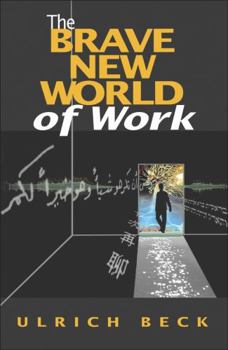The Brave New World of Work
Select Format
Select Condition 
Book Overview
In this important book, Ulrich Beck - one of the leading social thinkers in Europe today - examines how work has become unstable in the modern world and presents a new vision for the future. Beck begins by describing how the traditional work society, with its life-long job paths, is giving way to a much less stable world in which skills can be suddenly devalued, jobs obliterated, welfare cover reduced or eliminated. The West would appear to be heading towards a social structure of ambiguity and multiple activity that has hitherto been more characteristic of the developing world. But what appears to be the end of traditional working practices can also be seen as an opportunity to develop new ideas and models for work in the twenty-first century. Beck's alternative vision is centred on the concept of active citizens democratically organized in local, and increasingly also regional or transnational, networks. Against the threat of social exclusion, everyone can and must have a right to be included in a new definition and distribution of work. This will involve constant movement between formal employment (with a major reduction in working hours) and forms of self-organized artistic, cultural and political 'civil labour', providing equal access to comprehensive social protection. The aim must be to turn insecurity around, so that it becomes a positive and enriching discontinuity of life. Drawing on his earlier work on risk and reflexive modernization, The Brave New World of Work is also closely linked to his studies on globalization and individualization. These processes are part of the same challenge upon which a politics of modernity must now base itself. Not only the future of work, but also the very survival of democracy and the welfare state will depend on the development of a newly committed and 'multi-active' transnational citizenship. This book will be of great interest to second- and third-year students in sociology, politics, geography and the social sciences generally. It will also appeal to a broader audience interested in the issues and debates surrounding the changing nature of work.
Format:Paperback
Language:English
ISBN:0745623980
ISBN13:9780745623986
Release Date:January 2000
Publisher:Polity Press
Length:208 Pages
Weight:0.74 lbs.
Dimensions:0.6" x 6.0" x 9.0"
Customer Reviews
1 rating
Across the Great Divide
Published by Thriftbooks.com User , 23 years ago
When he's good, he's great. Some passages in this book, especially those dealing with Beck's idea of a new civil society that must be forged out of the remains of the social welfare contract, are inspiring. When he's not so good, it's because he's repetitive, or because he's speaking so generally about the effects of the global economy that he veers into vague abstraction at the expense of driving his thesis home. Because it's a challenging thesis -- the idea of paid civil work as a way to (re)create a truly democratic society -- and because it's articulation is at least partially supported through data, it's easy to forgive the sometimes too-general perspective. Read as a companion "The Global Age" by Martin Albrow, which is quoted in The Brave New World of Work, and interestingly, has the same strengths and weaknesses: an interestingly theory (we've moved past the post-modern age into the "global age" wherein the interconnectedness of humanity belies old national boundaries and notions of class), and a sometimes too abstract style.






